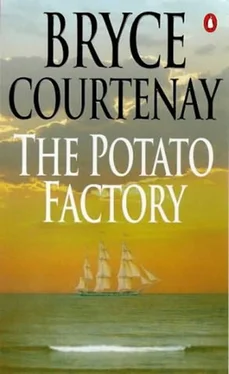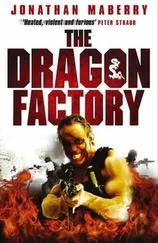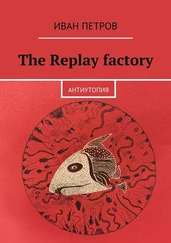Bryce Courtenay - The Potato Factory
Здесь есть возможность читать онлайн «Bryce Courtenay - The Potato Factory» весь текст электронной книги совершенно бесплатно (целиком полную версию без сокращений). В некоторых случаях можно слушать аудио, скачать через торрент в формате fb2 и присутствует краткое содержание. Жанр: Современная проза, на английском языке. Описание произведения, (предисловие) а так же отзывы посетителей доступны на портале библиотеки ЛибКат.
- Название:The Potato Factory
- Автор:
- Жанр:
- Год:неизвестен
- ISBN:нет данных
- Рейтинг книги:3 / 5. Голосов: 1
-
Избранное:Добавить в избранное
- Отзывы:
-
Ваша оценка:
- 60
- 1
- 2
- 3
- 4
- 5
The Potato Factory: краткое содержание, описание и аннотация
Предлагаем к чтению аннотацию, описание, краткое содержание или предисловие (зависит от того, что написал сам автор книги «The Potato Factory»). Если вы не нашли необходимую информацию о книге — напишите в комментариях, мы постараемся отыскать её.
The Potato Factory — читать онлайн бесплатно полную книгу (весь текст) целиком
Ниже представлен текст книги, разбитый по страницам. Система сохранения места последней прочитанной страницы, позволяет с удобством читать онлайн бесплатно книгу «The Potato Factory», без необходимости каждый раз заново искать на чём Вы остановились. Поставьте закладку, и сможете в любой момент перейти на страницу, на которой закончили чтение.
Интервал:
Закладка:
It was the custom of the Factory to elect female overseers and task mistresses from the prisoners and the superintendent of the Factory begged Mary to take such a position but she refused. They were obliged to accept that Mary carried more unsanctioned authority than those prisoners they had trusted with such a position. They also knew that those convicts appointed overseers would answer to Mary before them.
Payment by the troopers for services from the prison whores was now, as it had been at Egyptian Mary's, made not to the individual whore, but directly to Mary. She in turn negotiated the price of tobacco and grog among the corrupt turnkeys and, provided they did not become too greedy, paid them what they demanded. Mary retained a small percentage of the capital earned and paid the remainder to the prisoners who were owed it. This she did in money or in kind.
The clicking of her abacus could often be heard late into the night as she reconciled her ledgers. Mary's calculations were scrupulously correct and, while there are always those in a mutual society who whisper that the bookkeeper is a cheat, the ten percent she took from each transaction was considered by most to be fair for the task she undertook.
In fact, it had been an attempt by the prison officials to squeeze too great a profit from the prisoners which had consolidated Mary's position and proved the value of the ten percent levy. Those who profited dishonourably from the poor wretches under their care demanded an even higher price for their tobacco and grog. Mary refused and at the same time withheld the services of the prostitutes to the government troopers.
The Female Factory was unofficially endorsed by the military command as a soldier's brothel, and when it ceased to work the prison officials were forced to admit, in answer to the discreet though annoyed enquiries from the military command, that they could not alleviate the situation. This was the cause of much private embarrassment although, publicly, Governor Arthur had used it to his benefit. In fact, with much pomp and ceremony he had presided over an official commendation to the chief gaoler for having successfully put down prostitution in the Female Factory. In the same hour of the governor's departure the barracks commander had demanded, supposedly with the blessing of the governor, that 'the good work on behalf of my troopers be resumed at once!'
During the two-week strike Mary used the funds she had accumulated from taking her ten percent cut to purchase grog and tobacco which she dispensed to the workers while they were unemployed.
By organising the prison urchins, who could come and go as they pleased and, besides, had no problems evading the porter at the gate, Mary showed the corrupt officials that she had the means of bringing in adequate supplies of the commodities they had fondly imagined they exclusively controlled. Pressure continued to mount from the troopers who had come to see the Female Factory as their rightful source of recreation and so it was not long before commonsense prevailed. The turnkeys asked that the former prices should be maintained.
But Mary demanded the prices come down. She was sentenced to solitary confinement on bread and water on a trumped-up charge, but this manoeuvre was an abject failure. The prisoner whores refused to cooperate, although in all other things their behaviour was exemplary. In a pact which they named 'Legs crossed for Mary' they refused to lie on their backs on behalf of the Crown, and the authorities, fearing a public outcry, could not be seen to punish them.
Mary was released from solitary after only two days and a fair deal was struck with the turnkeys. Nothing like this had ever happened before. The fact that Mary had been prepared to be punished for their ultimate benefit deeply impressed the prisoners, and she now possessed their loyalty.
Mary also concerned herself with the prison urchins, and conducted a school for them for an hour each day in which they were taught to read and write. This ragged school was a great pride to the mothers of the children and also to many of the other prisoners, who were generally illiterate. They took comfort in the fact that ignorance was not, as they had been so often told, a permanent curse placed upon their kind by a malevolent God. Even the whores looked with satisfaction upon the slates the children carried and regarded these as a positive proof that their work was not unworthy.
However, it should not be construed that Mary's presence in the Female Factory had turned it into a place of calm and order. Prison is still an institution where the back is broken with hard labour and the soul is destroyed by despair. Despite Mary's efforts, this vile degradation had not changed in Van Diemen's Land. Sadness and despair are ingredients without which the recipe of prison cannot be made acceptable to society. If the old Female Factory had never worked better than under Mary's leadership, this was only that it was a lesser kind of hell on earth. One of the most palpable examples of this misery was the inevitable consequence of institutionalised prostitution, the illegitimately born child.
A great many of the children did not survive long. The poor diet in the Female Factory resulted in serious malnutrition and many mothers could not produce sufficient breast milk to feed their babies. Those infants which did survive were removed from their mothers as soon as possible after birth and sent to the orphanage, which was known as 'the nursery'. One of the most commonly heard sounds in the Factory was of a mother wailing at the enforced loss of her child, for it cannot be supposed that the whore has less love for the miracle within her womb than does the wife of a preacher.
However, this was not thought to be the case by the authorities and many of the population and proof thereof was rendered when a female convict, Mary McLaughlan, was executed for killing her newborn baby. Though children died like flies from the lack of food, hygiene and warmth in the Factory, this was thought to be quite in order, whereas the act of a mother putting her tiny infant out of misery, so that it should not suffer longer than its day of birth, was regarded as a crime so gross that the whole island was deeply shocked at this example of the brutalised convict mind. When Mary had gently asked her namesake why she had taken the life of her infant the little Scots woman had wept bitter tears. 'Acht, I couldnae bear the bairn t' suffer. I had nae milk in me teets nor ought t' save its wee life.'
The Reverend William Bedford, the drunken chaplain to the convicts who, in God's name, had been among the large concourse assembled to witness the last moments of Mary McLaughlan, preached a sermon while almost sober in the prison chapel on the Sunday following the hanging.
'She stood dressed in a snow-white garment with a black ribbon tied about her waist and a certain hope of forgiveness supported her in her final hour and, it is my belief, she died contrite and resigned.' Bedford looked about his congregation. Not all were prisoners and the townsfolk sat separated from the lewd looks of the male convicts by a curtain. 'On the falling of the drop, the instant before her mortal scene was closed, she did utter but three words of penitence, "Oh! my God!" though this may well have been a curse, I have chosen to see it as a plea to heaven for forgiveness! Hers was the dreadful crime of murder, the cold-blooded killing of the little innocent offspring of her own bosom.' He paused again, for he was in good form and had for once the complete attention of his congregation. 'Well has this first step to error been compared to the burning spark which, when lighted, may carry destruction to inconceivable bounds. But will mankind take a lesson from this?' He shook his head slowly then banged his fist upon the pulpit. 'Cannot the horrible tenacity be broken with which the Devil keeps his hold, when once he has put his finger on his victim?' The Reverend Bedford let this last sentiment reach the minds of his congregation before he added in a voice both sorrowful and low, 'I think not'.
Читать дальшеИнтервал:
Закладка:
Похожие книги на «The Potato Factory»
Представляем Вашему вниманию похожие книги на «The Potato Factory» списком для выбора. Мы отобрали схожую по названию и смыслу литературу в надежде предоставить читателям больше вариантов отыскать новые, интересные, ещё непрочитанные произведения.
Обсуждение, отзывы о книге «The Potato Factory» и просто собственные мнения читателей. Оставьте ваши комментарии, напишите, что Вы думаете о произведении, его смысле или главных героях. Укажите что конкретно понравилось, а что нет, и почему Вы так считаете.












